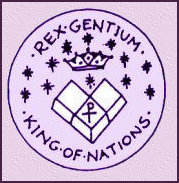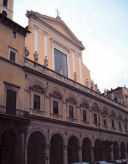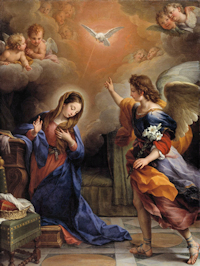Advent: December 22nd
Fourth Sunday of Advent; O King of the Nations (O Rex Gentium)
» Enjoy our Liturgical Seasons series of e-books!
Today the Church celebrates the Fourth and final Sunday of Advent.
"Hail, full of grace! The Lord is with you." But she was greatly troubled at what was said and pondered what sort of greeting this might be. Then the angel said to her, "Do not be afraid, Mary, for you have found favor with God. "Behold, you will conceive in your womb and bear a son, and you shall name him Jesus. He will be great and will be called Son of the Most High, and the Lord God will give him the throne of David his father, and he will rule over the house of Jacob forever, and of his kingdom there will be no end." (Luke 1:28-33)
O Rex Gentium (O King of the Nations) is the Sixth of the O Antiphons. A certain nobleman went into a far country to receive for himself a kingdom and to return" (Luke 19:12). This nobleman is Christ, the Son of God, King of all nations. His kingdom is over all men and over all things, both material and spiritual. He has everything in His hand as God and man. But another, Satan, has broken into His kingdom and has made himself master of many of Christ's subjects. In the old dispensation only a small part of humanity, the chosen people, remained faithful to the almighty King.
Christ, the Son of God, came into this "far country" in order to become man and, by means of humility, obedience, and poverty, to cast out the usurper who had taken His subjects. He came to reassert His dominion over all those who had left Him, both Jews and Gentiles.
For those following the Jesse Tree can continue through Christmas Eve, and also use symbols based on the “O” Antiphons (see Jesse Tree Instructions).
Jesse Tree Overview
Commentary on the Mass Readings for the Fourth Sunday of Advent, Year C:
The First Reading is taken from the Prophecy of Micah 5:1-4. In today's reading we hear words of hope that focus on one who is to be born in Bethlehem and who will bring in the day of peace when all nations will look to Jerusalem.
The Second Reading is taken from Hebrews 10:5-10. The perfect offering of Christ restores us to oneness with God. Jesus came to do the will of God perfectly. He overcame the power of evil that separates us from God and became our bridge back to God when we fall into evil. David prefigures Christ's sacrifice. The Psalm is now seen from the perspective of Christ.
The Gospel of this Sunday, Luke 1:38-45 recounts the visit of Mary to St. Elizabeth. An ancient title of Mary is Ark of the Covenant. The Church Fathers saw the parallels between the Old Testament wooden chest containing the divine presence and the Virgin about to give birth to Jesus. This theme is developed in a tape series by Tim Staples. Tim brings out the similarities between today's Gospel and the ascent of the Ark to Jerusalem (2 Sam 6:1-15).
1. As the ark is brought to Jerusalem, King David is overcome with awe saying, "How can the ark of the Lord come to me?" (v. 9)
2. The ark remains three months in the hill country near Jerusalem, bringing great blessings to the house of Obededom. (v.11)
3. King David leaps for joy—dancing before the ark. (v. 13) (Tim Staples, All Generations Shall Call Me Blessed)
In today's Gospel, Elizabeth says to Mary, "Who am I that the Mother of my Lord should come to me?" She tells how the babe (John the Baptist) leaped in her womb as she became filled with the Holy Spirit. Finally Mary remains three months with her kinswoman before returning to her home. This Sunday, so close to Christmas, the Church invites us to focus our attention on Mary, round-wombed because of the God-child. As we say in the Litany of the Blessed Virgin: "Ark of the Covenant, pray for us."
—Excerpted from Fr. Phil Bloom
This is the last Sunday of our preparation for Christmas, the anniversary of Christ's birth. Like Joseph, we can all feel unworthy of the honor of welcoming him into our hearts and our homes. We are indeed unworthy, not because we have little of this world's goods, but because we have so little humility, so little charity, so little faith and trust in God's goodness. Let us try to imitate Joseph and Mary, the humblest of the humble, the kindliest of the kindly, and the greatest-ever believers in God's goodness and mercy. We can never hope to equal them, but we can follow them humbly, from afar.
The feast of Christmas should draw the hearts of every child of God towards the furnace of divine love. In the manger, the infinite love of God for us miserable sinners is dramatically and forcefully portrayed before our eyes. In that helpless Baby, represented by a statue, we know that the person, and the power, of the omnipotent Creator and sustainer of the universe lie hidden "He emptied himself, taking the form of a slave" for us. He became a creature, like ourselves, so that he would make us sharers in his divine nature. He came on earth to bring us to heaven. He hid his divine nature so that he could cover us with it.
"Unsearchable indeed are the judgements of God, and inscrutable his ways." But though we are unworthy of his infinite love, it nevertheless stands out as clear as the noonday sun in the Incarnation. We realize that we can never make ourselves worthy of this infinite love, but let us imitate Joseph and accept the honor which God is giving us, as we trust that he will continue to make us daily less unworthy.
—Excerpted from The Sunday Readings by Fr. Kevin O'Sullivan, O.F.M.
O King of the Gentiles
"Come and save man, whom Thou hast made out of dust." What is man? He is but a particle of dust, an insignificant creature who has further separated himself from God through sin. He has been cut off from the fountain of truth and banished from God to darkness and misery. Still in the ruins there dwells a spirit that possesses a capacity for truth. In these ashes there is yet a spark that may be fanned to life to burn with the brilliance of divine life. But only God can revive this flame. For this reason the Church cries out, "Come and save man, whom Thou hast made out of dust." Save him who is so weak, so miserable and helpless. Remember his nothingness. Consider the many enemies who lay snares to rob him of divine life and to entice him into sin. Think of his obscured knowledge and his proneness to evil, of his tendency to error, and his weakness in the face of temptation. Guard him from the enticements of the world; shelter him from the poison of erroneous teaching; deliver him from the devil and his angels.
During these days before Christmas, the Church contemplates the overwhelming misery of unregenerated mankind. She cries out, "Come and save man, whom Thou hast made out of dust."
Jesus is King of all nations. "The kings of the earth stood up and the princes met together against the Lord and against His Christ. Let us break their bonds asunder, and let us cast away their yoke from us. He that dwelleth in heaven shall laugh at them, and the Lord shall deride them. Then shall He speak to them in His anger and trouble them in His rage. But I am appointed king by Him over Sion, His holy mountain.... The Lord hath said to Me; Thou art My Son; this day have I begotten Thee. Ask of Me and I will give Thee the Gentiles for Thy inheritance, and the utmost parts of the earth for Thy possession" (Ps. 2:2-8). Well may Herod seek the life of the newborn king. Indeed, many kings and tribes and nations in the course of time shall deprecate the divine King, Christ. But to Him has been given all power in heaven and on earth (Matt. 28: i8). Before Him every knee shall bend, and every tongue shall confess that He is the Lord (Phil. 2:10f.).
The more the mighty condemn the kingship of Christ, the more shall He be exalted by the Father.
Now He comes to us in the form of a lovely child. One day in the presence of the Roman governor He will assert His right to kingship. But after this one public confession of His royal origin He withdraws again into the obscurity which He had freely chosen. For the present He is satisfied with this manifestation of His royal dignity. The day will come, however, when He will manifest it with power and majesty as He comes again on the clouds of heaven. Before all nations God will declare: "I have anointed Him King of Sion. My holy mountain." All men shall pay Him homage as king; all nations shall acclaim Him the King of Glory.
—Excerpted from The Light of the World by Benedict Baur, O.S.B.
 6th O Antiphon: O Rex Gentium (O King of the Nations)
6th O Antiphon: O Rex Gentium (O King of the Nations)
Symbols: Crown and Scepter
Come, and deliver man, whom You formed out of the dust of the earth.
Traditional Antiphon: O King of the Gentiles and their desired One, the Cornerstone that makes both one; Come, and deliver man, whom You formed out of the dust of the earth.
O Rex Gentium, et desideratus earum, lapisque angularis, qui facis utraque unum: veni, et salva hominem, quem de limo formasti.
Vespers Antiphon: O King of all the nations, the only joy of every human heart; O Keystone of the mighty arch of man, come and save the creature you fashioned from the dust.
The crown and scepter signify Christ's universal kingship. As we sing in the fifth O Antiphon, Christ is not only the King of the Jewish nation, but the "Desired One of all," the cornerstone which unites both Jew and Gentile.
Recommended Reading: Revelation 15:1-4
Today is Day Seven of the Christmas Novena.
Advent Reflection: The Light of a New Humanity
Anyone who goes through our streets in the early days of December will often meet him, Santa Claus, dressed more or less as a bishop and never without his long white beard (which has been attributed to him since at least the eighth century). What these Santa Claus figures say and do is also more or less episcopal in nature; often they are more in the role of the bogeyman than of one who makes present the love of the Holy One, that love of which the legend speaks in many variations. It is almost impossible to tell with historical precision who this man was; and yet, by listening attentively to the oldest sources, through the mists of time, we can still discern the radiance of a figure who opens up a door to Advent, who can mediate, that is, an to of Jesus Christ.
In his portrayal of the life of St. Nicholas, his most ancient biographer, a certain Archimandrite Michael, says that Nicholas received is dignity from Christ's own sublime nature just as the morning star receives its brilliance from the rising sun. Nicholas was a living imitation of Christ: "In the radiance of his virtues", says the biographer, "the sun's righteousness has dawned." Tradition has always equated Santa Claus with the Bishop Nicholas who participated in the Council of Nicaea and, together with that first great assembly of bishops, helped to formulate the affirmation of the true divinity of Jesus Christ. What was at stake here was the core of Christianity, whether Christianity was to become just another sect or something really new, faith in the Incarnation of God himself. Was Jesus of Nazareth only a great religious man, or had God himself actually become, in him, one of us? So, ultimately, the question was this: Is God so mighty that he can make himself small; is he so mighty that he can love us and really enter our lives? For if God is too far away from us to love us effectively, then human love too is only an empty promise. If God cannot love, how can man be expected to do so? In professing faith in God's Incarnation, therefore, it was ultimately a case of affirming also man's capacity to live and die in a human manner. The figure of St. Nicholas, Santa Claus, illustrates and symbolizes this connection.
Theodor Schnitzler put this very well: "In putting his signature, in faith, to the mysterium of the incarnate Son of God, a person is enabled to be a helper of his fellow men, to bring happiness to children, families and the oppressed. Faith in the Incarnation promotes the salvation of mankind and the implementation of human rights."
The oldest sources concerning St. Nicholas also point in the same direction from a different angle: Nicholas is one of the first people of to be venerated as a saint without having been a martyr. During the persecution of Christians, those who opposed the pagan state power and gave their lives for their faith had quite automatically become great examples of faith. When peace was concluded between Church and state, people needed new models. Nicholas impressed them as one ready to help others. His miracle was not that of great heroism in the face of torture, imprisonment and death. It was the miracle of constant kindness in everyday life.
Another of the legends expresses it very beautifully in this way: Whereas all the other miracles could be performed by magicians and demons, and thus were ambivalent, one miracle was absolutely transparent and could not involve any deception, namely, that of living out the faith in everyday life for an entire lifetime and maintaining charity. People in the fourth century experienced this miracle in the life of Nicholas, and all the miracle stories which accrued subsequently to the legend are only variations on this one, fundamental miracle, which Nicholas' contemporaries compared, with wonder and gratitude, to the morning star reflecting the radiance of the light of Christ. In this man they understood what faith in God's Incarnation means; in him the dogma of Nicaea had been translated into tangible terms.
The morning star which receives its light from the rising sun—this ancient description of St. Nicholas is also one of the oldest images of the meaning of Advent. If we are to be continually lighting candles of humanity, giving hope and joy to a dark world, we can only do so by lighting them from the light of God incarnate. This, at the deepest level, is the message of all Santa Claus figures: from the light of Christ we are to light the flame of a new humanity, caring for the persecuted, the poor, the little ones—this is the core of the legend of St. Nicholas.
—Joseph Cardinal Ratzinger, Seek That Which is Above

Fourth Sunday of Advent
Station with Ss. XII Apostoli or Santi Dodici Apostoli (Church of the Twelve Holy Apostles):
At Rome, the Station is in the Basilica of the Twelve Apostles, better known in Rome as better known as Santi Apostoli. We receive today a twelve-fold blessing from the apostles with whom we celebrate this last Sunday of Advent. As living stones we are built on these twelve solid and sacred foundation stones who themselves rest on the divine cornerstone, Christ. Ye holy apostles of Christ, be with us and pray for us, that with well-prepared hearts we may "go forth to meet Him, and say: Great is His dominion, and His kingdom will have no end; He is God, the Mighty, the Ruler, the Prince of Peace."
For more on Santi Dodici Apostoli, see:
For further information on the Station Churches, see The Stational Church.






